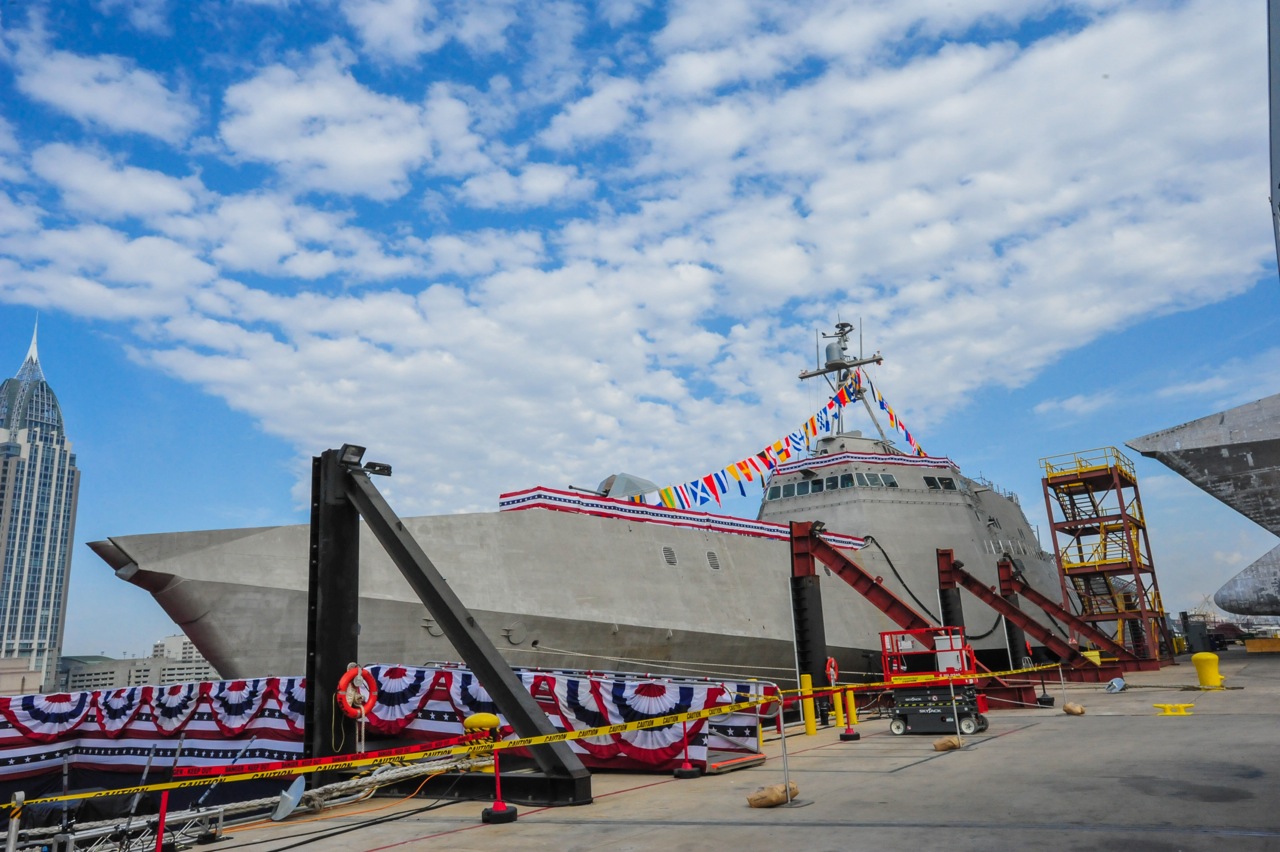
A previous version of this post indicated the prime contractor for the Littoral Combat Ship (LCS) Jackson was General Dynamics when it was in fact Austal USA. General Dynamics was the prime contractor for the first two Independence-class ships, not the first four. Jackson is the first Independence-class LCS with Austal as the prime contractor.
The Littoral Combat Ship Jackson (LCS-6) has completed its acceptance trials in the Gulf of Mexico ahead of a planned delivery to the Navy later this summer, Naval Sea Systems Command (NAVSEA) announced on Tuesday.
The 3,100-ton Independence-class LCS completed the five-day trial last week to prove “the performance of the propulsion plant, ship handling and auxiliary systems,” read the statement.
In addition, the Board of Inspection and Survey (INSURV) observed the ship and the crew preform “launch and recovery operations of the 11-meter rigid hull inflatable boat (RHIB), a four-hour full power run, surface and air self-defense detect-to-engage exercises, and demonstrated the ship’s tremendous maneuverability performing tight turns and accomplishing speeds in excess of 40 knots,” read the statement.
Jackson is the first of the aluminum trimarans built with shipbuilder Austal USA as prime contractor.
General Dynamics was the prime contractor for the first two ships.
Jackson part of a 20 ship deal the Navy inked with Austal USA and Lockheed Martin in 2010 for ten ships apiece of the Independence and Freedom classes.
Following commissioning later this year, Jackson will be stationed at Naval Station San Diego, Calif.
The following is the June 30, 2015 release from Naval Sea Systems Command.
NAVSEA Press Release: Jackson (LCS 6) Completes Acceptance Trials
MOBILE, Alabama. – The future USS Jackson (LCS 6) successfully concluded acceptance trials June 26, after completing a series of graded in-port and underway demonstrations for the Navy’s Board of Inspection and Survey (INSURV).
Acceptance trials are the last significant milestone before delivery of the ship to the Navy, which is planned for later this summer.
During the five-day trial, the Navy conducted comprehensive tests intended to demonstrate the performance of the propulsion plant, ship handling and auxiliary systems. While underway, the ship successfully performed launch and recovery operations of the 11-meter rigid hull inflatable boat (RHIB), a four-hour full power run, surface and air self-defense detect-to-engage exercises, and demonstrated the ship’s tremendous maneuverability performing tight turns and accomplishing speeds in excess of 40 knots.
“With each new LCS we run through the trials process, I’m reminded of the incredible and unique capability this ship gives our operators,” said LCS program manager Capt. Tom Anderson. “Jackson lives up to the task and Austal USA should be proud of the hard work they undertook to get us here.”
Following delivery and commissioning of the ship Dec. 5 in Gulfport, Mississippi, Jackson will be homeported in San Diego, California with sister ships USS Freedom (LCS 1), USS Independence (LCS 2), USS Fort Worth (LCS 3) and USS Coronado (LCS 4).
Milwaukee (LCS 5), Detroit (LCS 7), Little Rock (LCS 9), Sioux City (LCS 11), Wichita (LCS 13), Billings (LCS 15) and Indianapolis (LCS 17) are in various stages of construction at the Marinette Marine Corp. shipyard in Marinette, Wisconsin, while Montgomery (LCS 8), Gabrielle Giffords (LCS 10), Omaha (LCS 12), Manchester (LCS 14), Tulsa (LCS 16) and Charleston (LCS 18) are under construction at the Austal USA shipyard in Mobile, Alabama.
St Louis (LCS 19) and the yet to be named LCS 21 are under contract with Marinette Marine
Corp. and in the pre-production phase. Cincinnati (LCS 20) and the yet to be named LCS 22 and LCS 24 are under contract with Austal and in the pre-production phase.
LCS is a new breed of U.S. Navy warship, capable of open-ocean operation but optimized for littoral, or coastal, missions. USS Freedom and USS Fort Worth recently demonstrated these critical capabilities as part of their operational deployments to U.S. 7th Fleet in the Asia-Pacific region.
The Navy remains committed to a 32-ship LCS program and is leveraging competition, fixed-price contracting and serial production to reduce construction duration and costs.
The Program Executive Office Littoral Combat Ships (PEO LCS) is responsible for delivering and sustaining littoral mission capabilities to the fleet. Delivering high-quality warfighting assets while balancing affordability and capability is key to supporting the nation’s maritime strategy.
For more news from Naval Sea Systems Command, visit www.navy.mil/local/navsea/.





